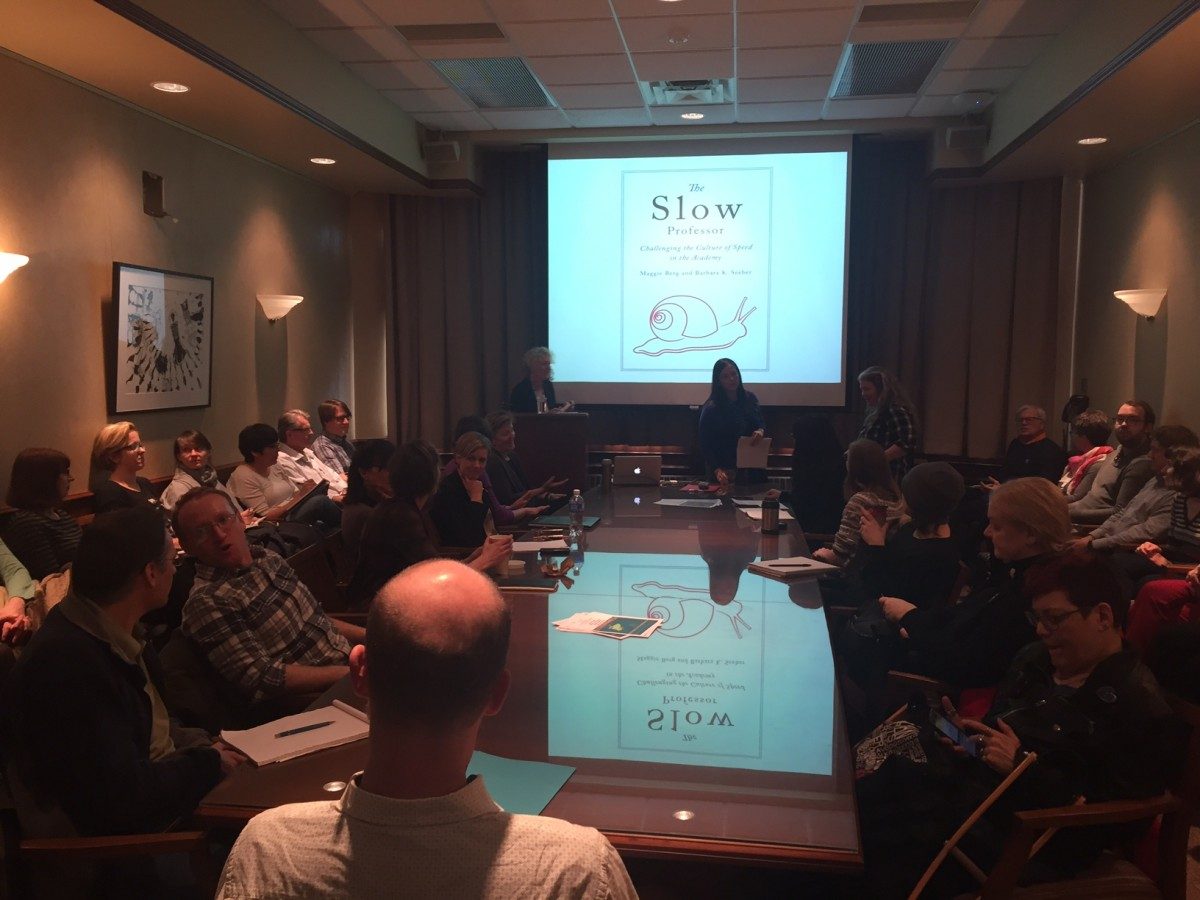
A full audience at the Institute for the Humanities // Paul Jenkins
A Leisurely Chat with a Couple of “Slow Professors”
Last week, faculty had the opportunity to listen to and engage in conversation with Maggie Berg and Barbara K. Seeber, authors of the highly acclaimed and widely read book The Slow Professor: Challenging the Culture of Speed in Academia (University of Toronto Press, 2016).
On Thursday, the two presented the main findings and arguments of their work to a standing room only audience at the University of Manitoba Institute for the Humanities. They met with a smaller group the following day to talk about collaboration and collegiality. The idea for the book emerged from conversations between Berg and Seeber about their own struggles to manage the stresses and pressures of academic work in an era of what has been called the “corporatization” of the university. At a certain point, finding their conversations both encouraging and helpful in a practical sense, they decided to open up their discussions to a broader public in an effort to spark positive change and resistance to what they call the “culture of speed” in academia. Unlike many of the recent books and articles on the corporatization of post-secondary education, literature on which Berg and Seeber certainly draw in their own writing, their aim was not to induce further anxiety and hopelessness among faculty, but to return a genuine sense of agency to their colleagues.
Their title, The Slow Professor, and the manifesto the book promotes, takes as its point of departure the principles of various Slow Movements in food, architecture, urban planning, and other domains. These principles include working in a more deliberate and careful fashion (as opposed to just managing ones time “more efficiently” in order to get more done in a day) and taking pleasure in ones research and teaching. They argue that this taking pleasure is one of the most subversive things faculty can do, just as taking time to grow, prepare, and eat food with pleasure subverts the corporatization of agriculture and the ethos of fast food consumption. The work of Berg and Seeber is grounded in a wide and impressive variety of literature in education, psychology, sociology, ecology, disability studies, critical theory, and literature, and touches upon topics such as loneliness, shame, perfectionism, shared affect, humor, and many more themes. Berg and Seeber are also very witty women, in addition to being first rate researchers in their respective fields and courageous champions of the importance of university education to society.
One particularly humorous moment in their presentation (and book) was when they drew attention to the recommendations found in time management advice manuals for academics, suggestions that included getting up at 4 a.m. to write two hours before preparing children’s lunches and cooking the family breakfast, and slipping in reading on weekends while infants are napping, or when one’s spouse is driving the family to a BBQ. Audience members laughed knowingly at the absurdity of some of these suggestions as well as the tendency of many of us to attempt these kinds of strategies in order to meet increasing pressure to perform at a rate of output that is unsustainable long term. It was clear in the course of the discussion that the book and the presentation resonated broadly and deeply with audience members. Maggie Berg and Barbara Seeber have certainly struck a chord among academics.
Their book, although written from a Canadian perspective and in part for a Canadian audience, has found a wide international readership. If UMToday readers are interested in learning more, they can tune into the Sunday Edition on CBC February 5th, to hear the authors interviewed by Michael Enright.






